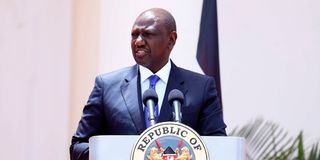Equalisation funds key to strengthening democracy

President William Ruto’s renewed efforts to fast-track the release of the Equalisation Fund to the marginalised areas will help promote development, democracy and inclusivity.
Equitable distribution of national resources is central to fostering a democratic, egalitarian and inclusive society and establishing a political dispensation and a culture of inclusivity. Resources and wealth — material or intangible — play a crucial role in shaping a society’s history, politics and its future.
Moreover, the most consequential social structure of any society, its politics, is predicated on its resources and wealth. Politics, as American political scientist Harold Lasswell defined it, is the power to decide who gets what, when and how.
For Vladmir Lenin, politics was the most concentrated expression of economics. Hence, resources and wealth have shaped and determined the politics, fate and historical trajectories of nations and societies.
Consequently, development disparity is a recipe for all sorts of political and social problems. Governments have political mandates to uplift geographies and localities that lag behind in social and economic development.
Moreover, unequal distribution of budgetary funds leads to social disharmony and exacerbates inequalities. The late Professor Ali Mazrui, in his book, The African Condition (1980), traces most of the post-colonial political violence and secessionist movements to unequal resources and wealth-sharing mechanisms in the African continent.
Political and economic marginalisation fosters breeding grounds for both political and religious extremism and violence. Inequality, in all its dimensions in a nation, must be addressed by redressing policies and programmes — when you fail to mend a crack in the wall, you will face a collapsing wall.
A democratic, harmonious and inclusive society is possible when national resources and wealth are distributed and shared with equity. Daron Acemoglu and James Robinson, in their book The Narrow Corridor (2019), warn of incessant political crises across the world due to unequal economic development trends.
They posit that there is a direct cause-effect relationship between liberties and democracy and equitable resource allocation. When there is a lack of resource equalisation mechanisms, the result is, on a global scale, mass migrations, civil wars and the rise of totalitarian politics.
Don’t we already see this trend in the European Union where unequal development has led to Brexit, and the rise of far-right politics and governments in Hungary and Poland — in the third world the conditions are worse?
Lately, Germany and France, the two most developed countries in the EU, agreed to increase the European Regional Development Fund (ERDF) to address the implications of development disparity.
Supplementary budget
President William Ruto’s renewed efforts to fast-track the release of the Equalisation Fund to the marginalised areas will help promote development, democracy and inclusivity. The Cabinet Secretary has forwarded an Appropriation Bill of Sh13.9 billion to Parliament for approval.
The new administration has also factored in a further Sh6.8 billion in the supplementary budget set to be approved by Parliament in the first quarter of 2023.
The Equalization Fund Advisory Board, which advises the Cabinet Secretary, has advised state agencies to pay pending bills to contractors for the completion of stalled projects. These efforts rekindle hopes for many who have been condemned to economic exclusion for decades.
After close to 60 years on the periphery, the most marginalised members of our society will have basic services, including water, roads, health facilities and electricity to improve the quality of services in those areas to the level generally enjoyed by the rest of the nation.
If utilised prudently, the Fund will help reduce the effects of the droughts, improve livestock and agricultural output and mitigate the inter-clan conflicts for scarce resources. This will in turn afford nomadic pastoralists the chance to take part in electoral processes.
Resources and wealth are contentious in any society. Politicians and pressure groups contest over resources and budget funding. To this end, the Equalisation Fund is not an exception, it is a ‘Political Fund’ in the sense that it has not been implemented for more than 12 years since its inception due to court battles between the county governments and the national government.
The High Court had, in 2019, given the county governments the role of implementing the Fund. However, members of Parliament, in a new Bill, are proposing to reverse the same. The gravamen of the MPs’ reasoning is that, like the CDF, Equalization Fund will best be implemented under their watch.
Regardless of who implements it, this Fund shouldn’t be left to the whims and logic of realpolitik. It is imperative to afford the fund some level of stability. It has only eight years before its constitutional timeline lapses.
Abdullahi Adan Khalif is a researcher, lawyer and a member of the Equalization Fund Advisory Board; [email protected] @_khalif




